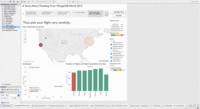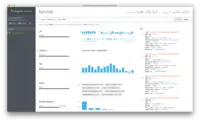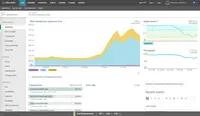Starting at $0.10 million reads
View PricingOverview
What is MongoDB?
MongoDB is an open source document-oriented database system. It is part of the NoSQL family of database systems. Instead of storing data in tables as is done in a "classical" relational database, MongoDB stores structured data as JSON-like documents with…
Recent Reviews
Awards
Products that are considered exceptional by their customers based on a variety of criteria win TrustRadius awards. Learn more about the types of TrustRadius awards to make the best purchase decision. More about TrustRadius Awards
Popular Features
- Availability (38)9.797%
- Performance (38)9.090%
- Concurrency (38)8.686%
- Security (38)8.686%
Pricing
Shared
$0
Cloud
per month
Serverless
$0.10million reads
Cloud
million reads
Dedicated
$57
Cloud
per month
Entry-level set up fee?
- No setup fee
For the latest information on pricing, visithttps://www.mongodb.com/pricing
Offerings
- Free Trial
- Free/Freemium Version
- Premium Consulting/Integration Services
Starting price (does not include set up fee)
- $0.10 million reads
Product Demos
MongoDB Change Streams: The Hidden Gem within the MongoDB Repertoire
YouTube
MongoDB & Tableau FAA Demo
YouTube
NoSQLMap MongoDB Management Attack Demo
YouTube
Intro to MongoDB with C# - Learn what NoSQL is, why it is different than SQL and how to use it in C#
YouTube
MongoDB with Python Crash Course - Tutorial for Beginners
YouTube
Features
Return to navigation
Product Details
- About
- Integrations
- Competitors
- Tech Details
- FAQs
What is MongoDB?
MongoDB is an open source document-oriented database system. It is part of the NoSQL family of database systems. Instead of storing data in tables as is done in a "classical" relational database, MongoDB stores structured data as JSON-like documents with dynamic schemas (MongoDB calls the format BSON), making the integration of data in certain types of applications easier and faster.
MongoDB's flagship Enterprise Advanced edition is a collection of products and services that drive security, efficiency, to put users in control of MongoDB Databases. These include:
MongoDB is available as a managed cloud solution via MongoDB Atlas. But MongoDB Enterprise Advanced offers advanced access control and data security features to protect on-premise or private cloud databases, and satisfy compliance or customer requirements. It’s also designed to make it easy to integrate MongoDB with any existing security infrastructure and tooling.
Organizations from startups to the largest companies can use MongoDB's capabilities to create applications never before possible at a fraction of the cost of some legacy databases. The MongoDB database ecosystem boasts over 10 million downloads, thousands of customers, and over 1,000 technology and service partners.
Also, the MongoDB Community Edition is licensed under what the company provides as the Server Side Public License (SSPL), which is based on the GPL v3. All MongoDB Community Server patch releases and versions released on or after October 16, 2018, will be subject to this new license, including future patch releases of older versions. The Community version of the distributed database offers a document data model along with support for ad-hoc queries, secondary indexing , and real-time aggregations to provide ways to access and analyze data.
MongoDB's flagship Enterprise Advanced edition is a collection of products and services that drive security, efficiency, to put users in control of MongoDB Databases. These include:
- MongoDB Enterprise Server - the commercial edition of MongoDB, which includes additional capabilities such as in-memory storage engine for high throughput and low latency, advanced security features like LDAP and Kerberos access controls, and encryption for data at rest. Enterprise Server is included with the MongoDB Enterprise Advanced subscription, which includes expert assistance and tools. Or, the MongoDB Enterprise Server is also available free of charge for evaluation and development purposes.
- MongoDB Ops Manager - Tools for managing MongoDB in a secure, on-premise or owned environment. Available through the MongoDB Enterprise Advanced subscription, Ops Manager eliminates operational overhead by automating key administration tasks such as deployment, and upgrades. Tools also support monitoring with visualization of performance metrics, continuous or point-in-time incremental backup, and query optimization with the Visual Query Profiler.
- MongoDB Enterprise Kubernetes Operator - Kubernetes Operators are application-specific controllers that extend the Kubernetes API to create, configure, and manage instances of stateful applications such as databases. On self-managed infrastructure – whether on-premises or in the cloud – Kubernetes users can use the MongoDB Enterprise Operator for Kubernetes and MongoDB Ops Manager or Cloud Manager to automate and manage MongoDB clusters.
MongoDB is available as a managed cloud solution via MongoDB Atlas. But MongoDB Enterprise Advanced offers advanced access control and data security features to protect on-premise or private cloud databases, and satisfy compliance or customer requirements. It’s also designed to make it easy to integrate MongoDB with any existing security infrastructure and tooling.
Organizations from startups to the largest companies can use MongoDB's capabilities to create applications never before possible at a fraction of the cost of some legacy databases. The MongoDB database ecosystem boasts over 10 million downloads, thousands of customers, and over 1,000 technology and service partners.
Also, the MongoDB Community Edition is licensed under what the company provides as the Server Side Public License (SSPL), which is based on the GPL v3. All MongoDB Community Server patch releases and versions released on or after October 16, 2018, will be subject to this new license, including future patch releases of older versions. The Community version of the distributed database offers a document data model along with support for ad-hoc queries, secondary indexing , and real-time aggregations to provide ways to access and analyze data.
MongoDB Features
- Supported: Comprehensive monitoring for full-performance visibility
- Supported: Automated database management for 10-20x more efficient ops
- Supported: Fully-managed backup for peace of mind
MongoDB Screenshots
MongoDB Video
What's New in MongoDB 7.0 Explained in 3 minutes
MongoDB Integrations
MongoDB Competitors
MongoDB Technical Details
| Deployment Types | Software as a Service (SaaS), Cloud, or Web-Based |
|---|---|
| Operating Systems | Unspecified |
| Mobile Application | No |
Frequently Asked Questions
MongoDB is an open source document-oriented database system. It is part of the NoSQL family of database systems. Instead of storing data in tables as is done in a "classical" relational database, MongoDB stores structured data as JSON-like documents with dynamic schemas (MongoDB calls the format BSON), making the integration of data in certain types of applications easier and faster.
MongoDB starts at $0.1.
Reviewers rate Availability highest, with a score of 9.7.
The most common users of MongoDB are from Enterprises (1,001+ employees).


























